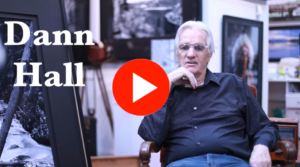Congressional hopeful Kaylee Peterson visits Reader office
By Reader Staff
Editor’s note: Kaylee Peterson has been campaigning as a Democrat against Republican U.S. Rep. Russ Fulcher since 2022. Amid a swing through 10 counties in Idaho in 10 days, she visited the Reader offices June 2 for an interview, which has been edited below for clarity and length.
SONCIREY MITCHELL: So, obviously, this is a deeply conservative congressional district in a conservative state. How are you working to win those conservative votes and really enact change?
KAYLEE PETERSON: I think I noticed immediately that my job was to be an out-and-proud Democrat in really kind of hostile conservative spaces — places, where they haven’t had a Democratic presence in a long time. So, I started my campaign by doing what I called “Republican town halls,” where I go into places like Orofino and Kamiah and Riggins and Grangeville and ask the Republican voters to question the Democrat: “Tell me what you’re worried about. Tell me what worries you about the ‘D’ next to my name. Let’s have a discussion.” … [T]hat was a really successful way to go into rural communities and for them to say, “Wow, she’s showing up,” and to start those conversations.
[A] lot of those conversations start pretty angry, because there’s a lot to be angry about with what’s happening in the government right now. So, then we just focus on policy solutions. And with rural communities, they respect the work ethic, they respect accountability and they respect solutions to the problems that they’re facing — actual work that can be done to fix what’s happening. …
So many Republicans, once they meet me, they’re like, “Well, you sound like a Republican,” because a lot of times our party politics are so personal, they’re not reflected in what’s happening at the national level. … [W]hen I talk about fiscal responsibility — when I talk about holding the government accountable — things like this, it sounds like what they support, even though I’m labeled a Democrat. And I think that’s at least where we start repairing what’s happened.
ZACH HAGADONE: You’re running this campaign without financial support from the party. How does that work? Do you feel like you’re able to get out your message — even with Republican voters — without any institutional Democratic Party backing?
KP: I think that’s why Idaho’s struggled to find somebody who’s willing to put in the time and work, because it is non-stop work. … [T]his is my 24/7 life. But I realized immediately when I started that if somebody wasn’t working to build that foundation and that infrastructure, that it was never just going to magically appear. And Democrats have culpability in what’s happened in rural America, because the DNC didn’t show up here in Idaho. They weren’t out in those rural communities, talking to people and doing the work. …
As a Democrat, I need to be in those communities building the ground game. And it’s slow and it’s agonizing, and it takes a ridiculous amount of work and the local candidates who are also doing this feel the brunt of that, but it’s working, and we’re building that relationship — and especially right now, when the current Republican congressional leadership is doing so much damage directly to these communities, it’s time where we can step in and say, “I can do this better. I can fix this problem; this doesn’t have to be that way.”
ZH: The Republican Party clearly has distinct camps at the federal level and even at the local level. If you were to be serving in Congress, are there camps within the Democratic Party that you would see yourself aligning with?
KP: … [T]he truth is there is no camp for what rural America needs from Democrats right now. And I think that’s why I’m trying to run this campaign, is to redefine what that should look like for rural America. …
We are truly trying to do something new that doesn’t fit any of the kind of groundwork that’s been laid by other people or other camps, because it hasn’t worked for Idaho. …
I call myself a Democrat, but I’m an Idaho rural Democrat … . We’re creating a truly Idaho candidate that focuses on Idaho issues and leads the way for a rural, progressive movement forward.
ZH: I’m very intrigued by this idea of the “Idaho Democrat,” because the Republicans have a real lock on this debate, it seems: “What are true Idaho values? What are true Idaho Republicans?” So, what is a “true Idaho Democrat”? How would you define that?
KP: My family homesteaded the North Eagle Foothills. My family has been [there] six generations. … [I]t was this idea of live and let live, mutual respect and community aid. You didn’t have to like each other, but you respected each other. You respected your right to live life the way that you wanted, and you showed up when there was an issue or a conflict, and you talked it out and you found the solution.
You focused on the problems and found a solution. … [T]hat’s Idaho values. It’s not ideological, it’s not how you believe or what you look like or any of these kinds of other defining ways, it’s how you act and how you behave in your community.
ZH: Do you feel like that mentality is under threat in the state — because of the influx that we’ve had from places like Southern California, from Texas? I mean, there’s a major, concerted ideological push to settle in Idaho. And people from that ideological background might say they like to help their neighbor, but it’s not really one of their big priorities.
KP: One of the worst moments I’ve had on the campaign … I did my hometown Eagle Fourth of July parade with my kids — and it’s the only time I’ve taken the kids on the trail with me — and they are 11 and 6, and we’re in my hometown and we’re throwing candy and popsicles, and they announce that we’re the District 14 Democrats. And the crowd turns, and everyone’s booing, which is bad enough, but my daughter — who’s throwing candy — is watching grown adults stamp the candy under their feet. People are throwing it back at us telling us to go back to where we came from. …
When we’re just living everyday life, if somebody’s tire is flat on the side of the road, Idahoans stop to help them out. We still wave at each other on the road. It’s only when politics enter the conversation that things all of a sudden turn really hostile in a way that I think contradicts our values. …
I run a very positive campaign in an effort to try and turn them around and show how we can take hostility and confrontation and turn it into something productive that works for every party. And that doesn’t mean we don’t hold people accountable.
SM: We’ve heard from quite a few people in our letters to the editor and just around town that the idea of tolerance and “live and let live” has been, in part, what’s sort of led to this hostile takeover — that’s led to the Trump administration. So, how does that mentality actually translate into policy changes for you?
KP: … [W]hat we’ve seen is the monopolization of markets. And so a lot of times our small businesses, our small family farmers can’t “live and let live” because they’re crushed under regulation and costs and all of these different elements, while these major monopolized industries — which they’ll never be able to compete [with] — have very little in the way of regulation, oversight and accountability. … I mean, 85% of our beef industry is run by four companies. Nobody can compete with this kind of 1% idea. So, I wouldn’t say “live and let live” for those at the top who really are unrestrained in any capacity versus what working class people on the ground experience.
ZH: As you’ve traveled around and got to know the congressional district, what are the big issues — and not just for Congressional District 1, but for North Idaho in particular?
KP: Well, the first one that comes to mind right now, just because of everything that’s happening, is public lands and federal workers. They did a study and 98% of Idahoans consider our lands and our wilderness to be essential to our quality of life. It is what most people move here and stay here for. Every person I talk to has stories about generations hunting and fishing and camping in the same spots. So, the public lands issue is huge, mainly because we can all recognize when you start getting rid of the regulations, the permitting process, and gutting the agencies that protect those lands and work those lands, then the only real option left over is to privately lease or sell. …
[T]hen, when we look at our congressional delegation and the amount of money that they’re getting from real estate development industries, it’s not too hard to see why public lands are under such threat. …
There’s this idea in national talking points that the federal workers are the “swamp,” are the corruption, but they’re not. They’re Idahoans, on the ground, serving their communities. They’re Forest Service workers, they’re rangers, they’re all of these people who try to manage the land with almost no resources. …
The next one, it’s gotta be cost of living. … [W]hen it comes to our small family farmers, the cuts to the USDA grants, the cuts to the federal government right now are only disadvantaging really small Idaho growers and businesses. It’s making it impossible in any way to compete at the top. And so the federal cuts once again are hurting rural communities’ ability just to survive and make ends meet. …
The third issue, I’m stuck between education, health care and reproductive rights. These are things that everybody is dealing with on a day-to-day basis. …
[T]here’s so much that’s gone wrong right now. And I hate the idea that in politics, we only expect those we elect to fix a singular problem, or to focus on one thing. I think if you’re elected to Congress, your responsibility and expectation is to fix it all. You have the greatest privilege and power in the country. You should be able to look at the bigger picture and address all of the problems that people are facing. …
People can’t survive on what they’re making in Idaho. We had the potential for massive job growth, but with the massive cuts that they’re making on previous legislation — like the CHIPS and Science [Act], like the infrastructure bill, things like that — that job growth is going to decrease. … [I]t’s going to make it almost impossible for rural communities to make ends meet when they’re already struggling to do so.
I just stopped in Bonners Ferry and the amount of Canadians crossing the border has decreased 12-17%, and that doesn’t sound like much except that most of these businesses are already operating on a razor-thin margin. That 12-17% is the difference that could shutter their businesses.
So, all of these federal policies that are being enacted right now under our current leadership are immediately harming anybody’s ability to make ends meet, and it’s time that we had a working-class candidate.
SM: Let’s talk about us as a border community. When we interviewed Rep. [Russ] Fulcher, he said that he hadn’t really thought about the fact that we are a border community, and he was very much focused on the Mexican border, which we don’t touch. If elected, how would you deal with the current border issues that we’re facing with Canada?
KP: … I went to visit the border yesterday, to see what was going on there, and Idaho’s border is unbelievably well managed. They do a fantastic job. It was so funny because I asked, “Do you recruit nationally, like most border agents down south do?” and they were like, “Yeah, but we’re all from Idaho.”
We have locals who know the community, know the issues. They do a fantastic job; but, unfortunately, the fear mongering that has happened around our southern border and other points of entry has, once again, decreased visitorship. It’s basically hurt every opportunity for that community to make the money that it needs to make. … [A]ll that they’re doing at the southern border is actually harming our well-functioning northern border.
What I’ve learned is you focus on the problem, not on talking points. It’s really frustrating because, right now, nationally, there’s a lot of these talking points coming from special interest groups, and the numbers don’t make any sense. I once had this sweet woman who said, “There are 200 million illegals in this country.” And I said, “There’s only 340 million of American citizens, and we call them ‘undocumented people.’”
The truth is, our immigrant community has the lowest rates of criminality out of any other demographic in this country. Almost every person that comes into this country has contact with border agents. There is a system under which people are crossing into this country. The problem was, it was undermanned, understaffed, underfunded — they needed some technological upgrades and we needed to streamline the process by which people could get legal immigration status. If we had just addressed those problems, then it would have been fine.
And I will tell you, I haven’t met a single Idahoan who has actually dealt with a problem with our immigration in person. This is all national talking points. …
I was really thrilled that the previous administration got a $1.3 billion investment from the Mexican government into the technology we use at legal points of entry to catch things like fentanyl and criminals. I think that that just shows diplomacy and the way in which we partner with our border countries is really, really important to solving the issues on the ground that people face.
ZH: Now we have this diplomatic crisis with the tariff backlash, where Canadians are staying away — not because of any issue with the border itself, but with an issue with the United States and with its politics — what can you do on the tariff side to ease that?
KP: Not do tariffs. I’m not naive enough to think I can singlehandedly undo the tariff disaster, and I do think we are going to feel the impacts of what is happening right now. It’s going to take generations to fully repair. What should have happened, in the place of this tariff war, in order to help American trade systems, is to focus on investing in American manufacturing. Because the more America manufactures, then the more we can export, and the better. But if you just destroy all of the necessary exports that Idaho farmers rely on to make money, and you destroy the ability to import the goods that American businesses need in order to survive, then the only people who are going to survive this are, once again, the already monopolized industries that small businesses can’t compete with.
I don’t think that there’s a way forward unless none of the tariffs actually happen and we have a quick turnaround in leadership that works with other countries on appropriate trade deals while building up American manufacturing so we can have job growth and we can compete on the national level. And that rolls into diplomacy, right? Just trying to make China say, “Uncle,” doesn’t make America the greatest country on the global scale. We need to earn that by having the manufacturing and the trade and the shipping and all of these kinds of systems in place. We haven’t invested in those, which is why we’re losing footing. I think that’s where I would focus my attention.
ZH: Do you see a coalition of Congress members who would be willing to work in that direction?
KP: … I’m seeing a whole new generation of working-class candidates step up across the country, and we’re starting to see those people find success. There was a shocking statistic: Less than 2% — and I don’t know if this is Congress specifically or all elected officials — have a working-class background.
[Editor’s note: According to a Duke, Loyola-Chicago study based on 2023 figures, fewer than 2% of state lawmakers from either Republican or Democratic parties came to office from working-class jobs. Further, about 1% of Republicans and 2% of Democrats in state legislatures came from working-class backgrounds. Similar data for Congress is hard to verify, but reporting from sources ranging from The New York Times to the Center for Responsive Politics agree that more than half of U.S. Congress members have a net worth in excess of $1 million. The top 50 wealthiest Congress members have net worths ranging from more than $10 million to nearly $550 million.]
… The average income in Idaho is $30,000 a year And so it is a very, very different existence trying to make ends meet on $3,000 a year rather than $175,000 a year. And these are the people I’m seeing step up and start taking control in Congress and make their voices heard.
[Editor’s note: Idahoans’ per capita income in 2023 dollars is $37,169, according to the U.S. Census Bureau, while households earn a median of $74,636 per year].
We need fighters. And so I do think that, once elected, that there would actually be a large contingent excited. When I first started running, I wanted to join the Problem Solvers Caucus specifically for this reason. They were just Republicans and Democrats focused on problems and policies that solved them, and that was really attractive, but I think we need a louder version of that.
ZH: Speaking of working with people who aren’t even in your own party, I’m thinking about Rep. Mike Simpson co-sponsoring the Public Lands in Public Hands Act. What’s your feeling on that piece of legislation? If you were in Congress, would you support that? Or is that the wrong direction to go?
KP: Here’s the problem: Things are so bad right now, that any solution is better than the alternative. … We have major corporations that are leasing the land, and now people are paying $500 for a tent permit and $1,000 to bring a camper on the lands that are supposed to be [public]. We’re having clear-cutting issues. We’re having a lack of oversight and regulatory processes … .
But I’m excited that the second [congressional] district does have somebody looking at the issue. I am excited about Keep Public Lands in Public Hands. I have heard a lot of concern from federal workers, from Forest Service workers, about the 300-acre lots … I would like to have a conversation about whether or not that’s negotiable, but 100%, I would love to work on a solution with Mike Simpson.
ZH: If you were to work on that issue, you would lobby for that to be a smaller acreage? Is 300 acres too big?
KP: I would like to remove it altogether. It only really works for real estate developers and out-of-state buyers. But I’m not naive. Any solution compared to what we’re facing right now, I’ll do what’s best for the people, no matter what.
SM: Going back again to something you mentioned earlier with women’s reproductive health — specifically at Bonner General Health, we lost our maternity ward, we’ve lost our OB-GYNs. Is there anything you can do?
KP: Fight like hell. I don’t think people realize how instrumental Russ Fulcher was in making this happen. Because I’ve seen his private town halls. I’ve seen his smaller events, and the way he talks about this is a lot different than when he’s on television or in the media. He’s out there telling rural communities that people like me believe in abortion after birth. You’re telling people we’re literally murdering babies and I get called a “baby murderer” because of that. …
[M]y district has lost three maternity wards in Emmett, Nampa and up here in Sandpoint. We’ve lost 25% of our OB-GYNs, 50% of our maternal fetal specialists. Thank goodness, we were able to get a [maternal mortality] review board back in some capacity …
[I]t’s not a local issue because it’s happening from the federal level, and I hear all the time, “States should be able to decide.” Well, how about we let women decide? Because there’s nobody in the government, in office, who can ever dictate what’s best for a woman [better] than an Idaho woman and her family and her physician.
And it has become impossible to attract any new kind of medical leadership into the state. Doctors don’t want to train here — even the rural programs we had to bring doctors into unattractive areas are unable to bring people in. Doctors who aren’t leaving are retiring. And this isn’t just affecting Idaho. On the Washington [and] Oregon borders, physicians are so swamped that some of them are starting to retire and worry about being sued by trigger-happy people on the pro-life front.
This has done unbelievable harm, not only at the federal level, but on a personal level. Six times as many women are being lifeflighted out of the state for emergency care. Thankfully, they finally passed the EMTALA [Emergency Medical Treatment and Labor Act] protection, but Russ Fulcher was on the steps of SCOTUS arguing against that … saying, “Emergency care has nothing to do with abortion.”
I’m sorry, but if you’re a congressman, you at least have the responsibility to understand what reproductive health looks like. And I understand this as a woman and a mother; I understand this as somebody who’s experienced pregnancy loss, but I also understand this because I talk to women, the OB-GYNs, the maternal specialists across the state, and not one of them has stated anything other than, “complete autonomy for the women and doctors be able to make decisions.”
If [Fulcher] was on the ground talking to these physicians, he would say the same thing, but he’s not. He’s working with special interests on the pro-life [front]. …
So in Congress, this would be a massive issue for me. I would be right up there, one of the loudest voices, ensuring that Idaho women have the protections that they need and Idaho physicians can practice without fear of some big government mandate throwing them in prison.
ZH: So, short of going to the Supreme Court … what are concrete things that a person could do in Congress to alleviate problems like we have in Bonner and Boundary counties?
KP: The scariest moment on the campaign trail for me — and it sticks in my head for this very reason — is I ended up in a snowstorm having to drive from Sandpoint to Bonners Ferry and back to Sandpoint. … I almost did not make it. And I think about, not only women who are having to drive this far when you don’t have that much time in an emergency, but just even prenatal [care] … . But then I think about winter months, when things do get extreme and the loss of life, the loss of opportunity, how scary that must be.
I know so many people who have left the state for this reason — not just women of childbearing age who want to start families, but older women who are worried about their reproductive health, cancer screenings, things like that, things that save lives.
So I think at the federal level, we have to use Congress to codify these rights, immediately passing broad, sweeping legislation that immediately codifies every right for women to choose, every right for a physician to practice. Get the government out of this issue, because it has no place in it.
ZH: How would that work with the Supreme Court?
KP: Well, it can go to court. That’s the three branches. But I think as quickly as we can address the issue. And that’s what Fulcher has done with this Trump administration: just to throw everything at the wall, federal courts be damned. We’ve seen it have negative impacts, well, I think it’s time we turn that around. Roe was on shaky grounds because it was more privacy based, and so I think if we get more specific with the legislation and exactly what we’re protecting, medical things like that, then I think we can start circumventing what the federal courts were ruling. …
I think that the more succinct we could be with the legislation passed — even if long-term, SCOTUS tries to fight it — then at least in the short-term we can provide some kind of relief and fight that battle at the Supreme Court level. …
I think Congress has a ton of power to be able to provide some short-term relief while we fight the jiu-jitsu battles.
ZH: The “big, beautiful bill.” We’ve got cuts to Medicare, Medicaid, SNAP and education — you name it. Assuming that you don’t support those kinds of cuts, what cuts would you support, if any?
KP: This drives me crazy. At the national level, I don’t know how every congressperson isn’t screaming about how much this government wastes in corporate handouts. Right now, our taxpayer dollars go to fund almost $800 billion in subsidies and corporate handouts, just in the fossil fuel industry. Ninety percent of Humana’s profits come from taxpayer-funded indigent services from the government. We spend an ungodly amount of money for monopolized industries, and then we say we have to cut Social Security, which people have paid into for decades. …
We just have rigged the game for this top 1%. And then, a lot of times when I talk to rural communities, they’re like, “Well, that’s the American dream. That’s the American success story.” I like to remind them that the top 3% of earners in this country are closer to poverty than they are to the 1%. We are not talking about successful American-made stories. We are talking about centuries of industries that have rigged the game in their favor and are paying Congress directly.
What was it? Twenty corporations spent $4 billion just in 2022 on lobbying Congress alone? How much money do you have to be saving through congressional legislation for that to make fiscal sense?
[Editor’s note: According to a January 2024 report from NBC News, an unspecified number of lobby groups spent $4.2 billion to influence federal lawmakers in 2023. Added with state lobbyist spending, that figure rose to $5.6 billion. In 2022, combined state and federal lobbying rose to a record-breaking $5.9 billion.]
So no, we don’t need to cut Medicaid, Social Security, education, federal lands, Forest Service. We don’t need to be cutting these agencies. We need to be looking at the handouts, and many of these handouts — these subsidies — were meant to be going to small agriculture, small business, and they cannot compete in order to get this kind of money. So, I think that we need to start looking a lot higher at where we make those cuts and where those handouts are, and who’s really milking the system. …
The amount owed to the IRS right now is staggering. It’s just under $700 billion, and the IRS has stated they only believe they can collect $90 billion of that. So, over $500 billion, just in unpaid taxes to the IRS. There are massive amounts of money, and when DOGE came in and just took a wrecking ball to the essential services that, specifically, rural communities need to survive without once looking at any of those handouts, that’s when I knew, once again, that the system is rigged against working-class people. …
I wrote an op-ed about this and I called it — because Fulcher is touting the KEEP Act, the one bill he’s almost close to passing in seven years in office — I called it “Crumbs from a Banquet Table that We’re Not Invited To,” because that’s exactly what it is. The tax credits that they are offering are not enough to make up for the increased cost of living, the cuts in services, the cuts in agency.
Life is about to get more expensive and even harder for everyday, working-class Idahoans. “But they’ll have a tax credit at the end of it.’” And so the “big, beautiful bill” is a nightmare for most people, and most families, including mine.
I think that’s why it’s time we have that kind of representation in Congress. We need those voices more than ever, because we don’t hear from them, and I’m trying to use this campaign as a platform to give them a voice and an advocate so that they feel like they might have some kind of impact on the government. That’s what everybody wants — Republican or Democrat. They want what they say and what they need and what they do to have an impact on how government represents them.
Zach Hagadone is editor-in-chief and Soncirey Mitchell is senior writer of the Sandpoint Reader.



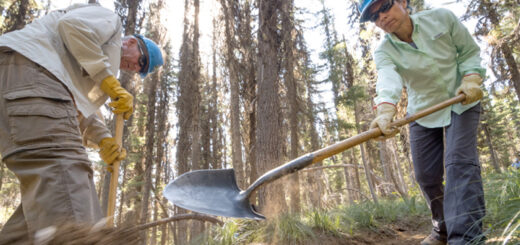


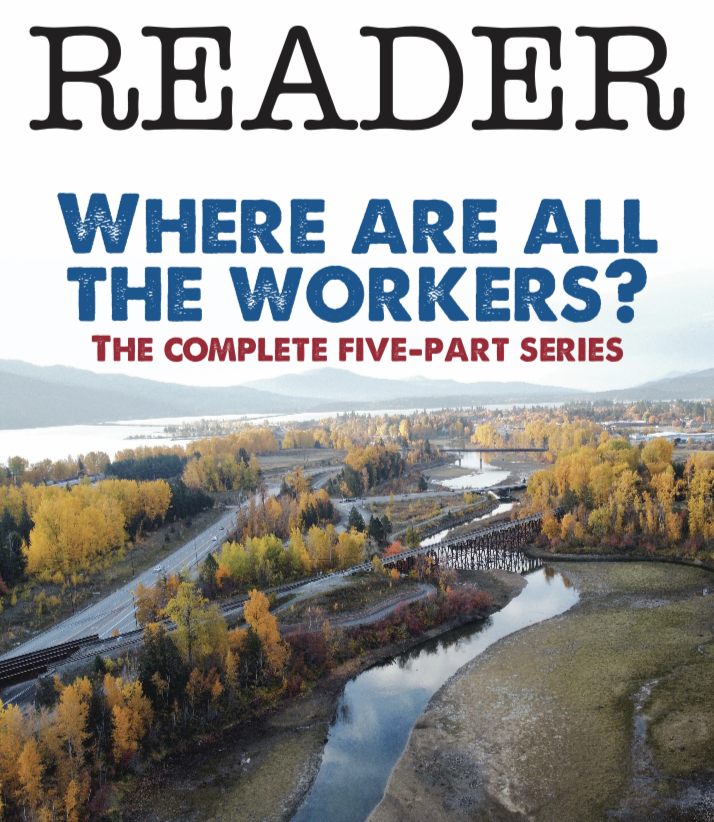
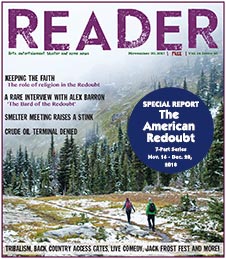
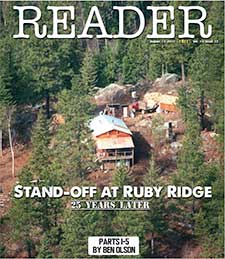


 Coming up this week! Don’t miss Live Music, the Summer Sampler, the Art Party, Monarch Grind, the Sandpoint Renaissance Faire, and more! See the full list of events in the
Coming up this week! Don’t miss Live Music, the Summer Sampler, the Art Party, Monarch Grind, the Sandpoint Renaissance Faire, and more! See the full list of events in the 